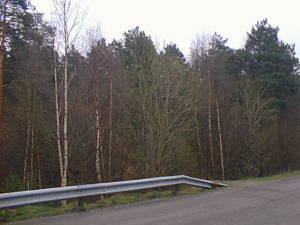Good Friday 21 April 2000

|
Pic of the day: So, will the forest suddenly turn green on Easter Day? *** Is it Friday already? My, how time flies when you are alone! Today I should have posted the third and final entry on the impact of evolution(ism) on western culture; but because of the Easter, I decided to write something more topical. Well, slightly more topical. Gods of death and sin In Bronze Age religions, there were often a character which we call "the young god". The actual names vary: Adonis, Tammuz, Baal are probably the most familiar. The young god could also be thought of as a god of seasons, or the god of the crop. A specialized form of fertility god, the young god every year fought against the evil god of the infertile season and lost. (Well, actually this battle happens in mythological time, but it is re-enacted every year in nature and culture.) The young god died and went to the Land of Shadows. Enter the Goddess and her followers. Crying over the fallen god, the power of their love eventually leads to his resurrection in glory and the defeat of the bad god. Spring (or the rainy season or something) asserts itself yet again, and the forces of life grow abundant. So y'all will forgive me, I trust, that I don't go in procession on Good Friday whipping myself and wailing loudly. I think Jesus would have turned in his grave over being used as a stand-in for Tammuz ... if Jesus had been in his grave. Which he ain't. So drop it already, OK? He's not dead. Unless he's currently dying for the sins of the sentient locusts of Beta Coronis or something... *** I have in the past pondered whether or not sin is a necessary part of a species' road to spirituality. I think not. I suspect that we humans did come into sentience too early. The most evolved dolphins, after all, are more intelligent than we: They have a better memory and are able to navigate mazes with less trial and error than the average human. They also have a language and strong social ties. But they do not seem to have a clearly developed sense of individual self. As I recently mentioned, they seem to lack the feedback loop that makes it possible for each of us to keep ourself company. To be not only aware of ourself, but even aware of our self awareness, and so on. The danger of course is that we become bent in on ourself, curled up in an ever tighter spiral of self concentration, until we end up as a spiritual black hole. And let us face it: The most common source of sin is not evil, but selfishness. Egotism. The average thief does not steal because he wants to deprive you of your belongings, but because he wants them (or the money) for himself to use. The man who cheats on his wife does not do so to cause her grief, usually. He just wants more pleasure for himself. And so on it goes. Countless wars have been started by greed, and countless lives lost. All because people covet more for themself. Black holes that grow more hungry the more they swallow, who cannot be satisfied till they have the entire universe. As Nietzsche is quoted: "If there is a God, how can I bear to not be one?" The world is not enough, we want to own the universe. Now, I am not sure that we would be better people without compounded self awareness. After all, the chimps lie and steal too. And even the otherwise friendly and helpful dolphins will occasionally resort to rape or infanticide to spread their genes. But they don't know what they are doing. (Now, on this day in particular, there seems to be some dissent as to whether or not we know what we do. But at least I think it can be agreed that we know more than animals.) With self awareness, we must also take personal responsibility for what we do. On the bright side, we can also feel true accomplishment when we do what we know to be right, even though it means sacrificing an immediate pleasure. We can judge ourself - not just like a judge in a courtroom, but like in a contest. However, our judgement often fails, as do we. It may seem like we were thrown into this perilous stage too early, before our minds were ready. For our judgement is still clouded by the blind desires of an animal, and the grip of reason is tenuous at best. This then is my concept of sin. Not a cutesy word for sex, but an inherent failure, a lack of capability to make the right judgements in life's many choices. (What I really believe is not judged by what I say I know, but what presumptions I act on.) As such, sin is both a state of being and an instance of action. And as such, it requires not punishment but enlightenment - for if we fail to embrace enlightenment, we continue to degrade the self. And what punishment can compare to the loss of inherent quality? And what good would an eternal life be, if it was one of hate and greed? *** Now you can see why I am considered a heretic even among the heretics. But be that as it may, here I am. I will strive to revert to less abstract topics in the future, if any. |
Took a long walk today. It was quite a while since last time. I could feel that in my legs! |
Yesterday <-- This month --> Tomorrow?
One year ago